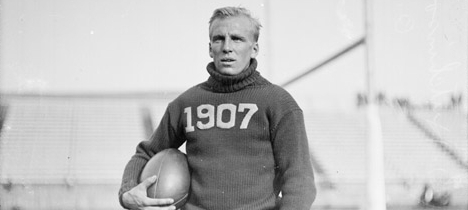
This is the question that many are asking today. Pastor David, an avid fan of football, and his friend Jimmy Scroggins (Pastor at FBC West Palm Beach) respond to this question in a recent article over at the Ethics and Religious Liberty Website.
They write:
The question of whether football is too violent to be deemed ethically acceptable is not a new one. In 1905, the game was far more violent and brutal than today – 18 men died on the college football field, which led then Harvard president Charles Eliot to describe the game as having “barbarous ethics” worse than “cockfighting” and to call for the abolition of football on college campuses. In response, President Theodore Roosevelt described such an attitude as foolish and stated his concern about producing “mollycoddles instead of vigorous men.” Roosevelt said, “I believe in rough games and in rough, manly sports” and asserted he had no intention of allowing Eliot to “emasculate football.” He committed himself to doing everything he could to save football. His efforts resulted in a few changes that rescued the manly game he loved.
But perhaps the game has changed again. The NFL recently settled a lawsuit with former players over brain injuries for almost $1 billion. Shouldn’t this new science the brain injuries caused by football change how we thing?
They respond:
Nevertheless, it is wrongheaded to use data from NFL football players who have made the game their career at the highest level and attribute it to everyone who plays football. An estimated 3.9 million people participate in playing football in America each year and of that number only 68,000 participate on the college level and 1,696 are on NFL rosters. More than 95 percent of the people who participate in tackle football are under 18 years of age. It is nonsensical to use data related to career NFL football players and use the findings to cast a dark shadow on football in general. There is a qualitative difference between playing youth football and the National Football League. However, despite the logical difference, many American parents are keeping their children out of youth football; according to an annual survey by the national Federation of State high school associations, more than 25,000 fewer kids played football in the US in 2012 than only four years before. This is tragic.
So, if football is relatively safe for the culture at large, should Christians still abstain?
They write:
While the Bible does not mention modern sports like football, it has much to say about warfare and Kingdom, and it draws a relationship between sport and war. Sporting contests are artificially constructed mini-battles, whether they are wrestling or boxing matches (both specifically mentioned in the Bible), or baseball and football. And the lessons learned agonizing and striving in one can readily prove instructive for the other (Heb 12:1-4, 1 Cor 9:24-27, Eph 6:12, Phil 3:13-14). In fact, the primary images in the Bible describing the struggle of living as God’s people are: soldier, athlete and farmer (2 Tim 2:4-7). Each calling is difficult and physically demanding, requiring a man to train and sacrifice his body. The use of sports imagery in the Scripture is instructive and overwhelmingly positive in drawing a link between sports, war and ministry in the Kingdom of Christ.
They continue:
Football represents one of the only major American institutions still standing that is exclusively for males and speaks unashamedly about manliness and toughness. Boys are drawn to demanding physical competition against other boys, assertive male leadership, and a cause that demands sacrifice and calculated risk. These are good things that ought to be cultivated on a pathway from boyhood to Christian manhood.
Courage and calculated risk-taking are causalities of our contemporary safety-centric worldview. Sadly, evangelicals seem to be leading the movement to train bravery and adventure out of our children in favor of a cult of safety. Boys, who are virtually bubble wrapped by their parents to ride bikes in the front yard and do not participate in things like football because they might get hurt, will have a difficult time finding Paul remotely intelligible when he asserts, “For I am ready not only to be imprisoned but even to die in Jerusalem for the name of the Lord Jesus” (Acts 20:13).
I highly recommend this article to you. You can find the full text here.




